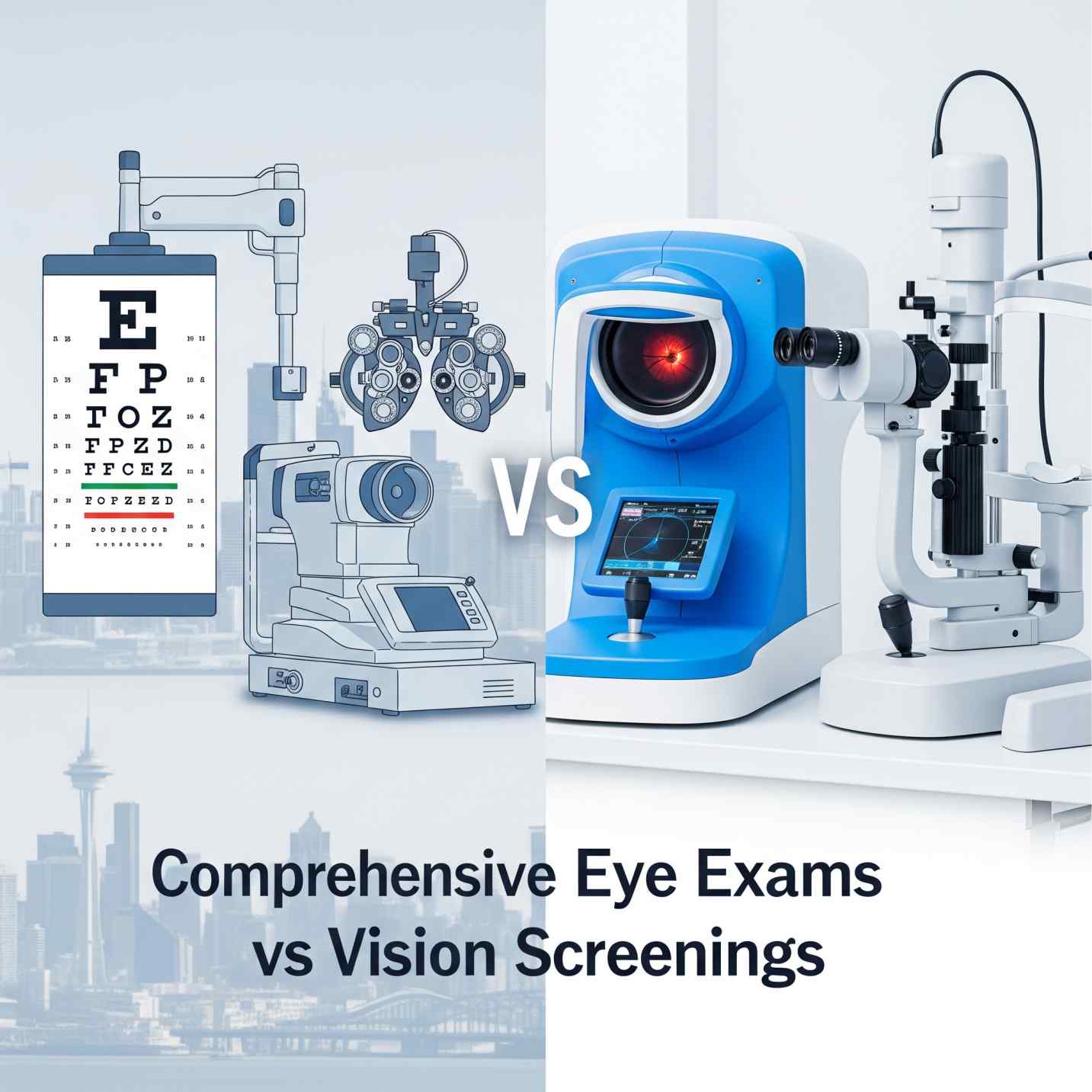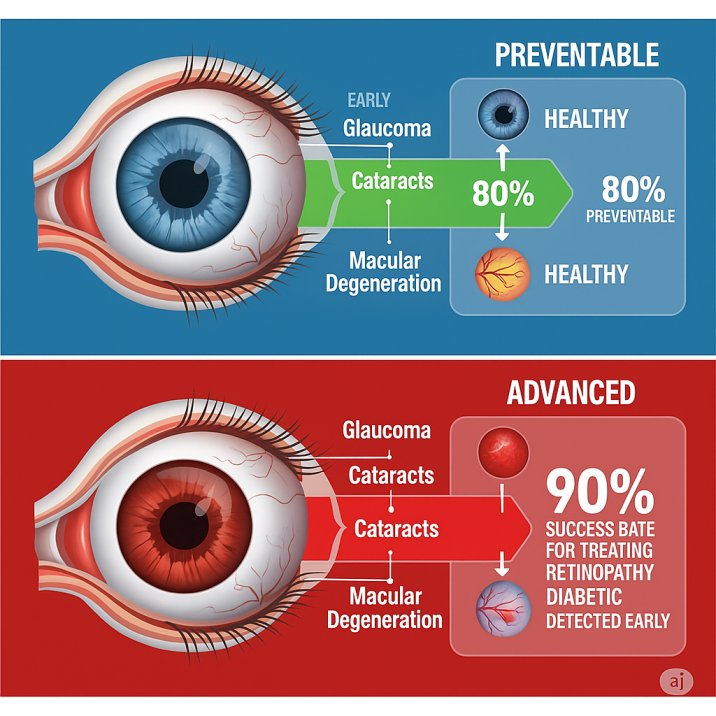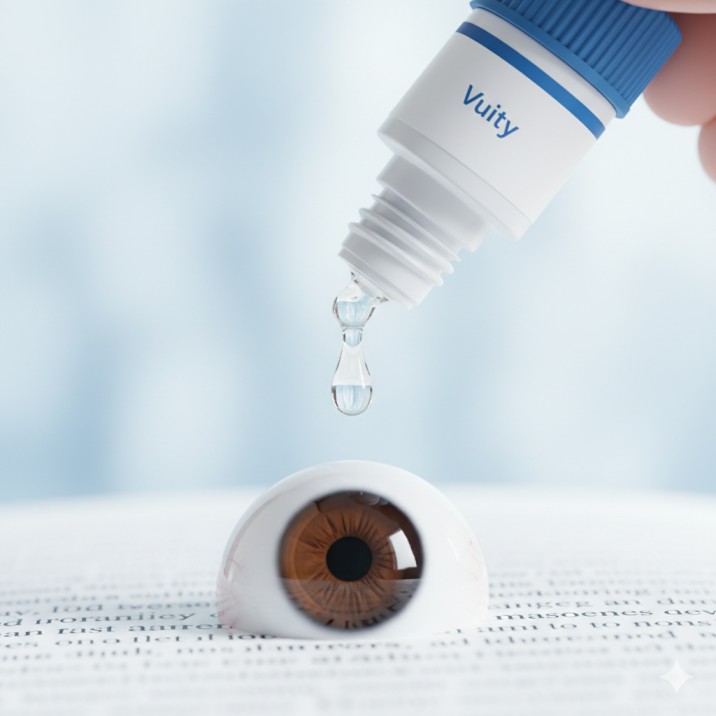Eye Exam vs Vision Screening: Seattle Patients
Bottom Line: Comprehensive eye exams detect serious conditions like glaucoma and macular degeneration before symptoms appear, while vision screenings only check basic sight clarity.
If you’re a busy Seattle professional seeking a comprehensive eye exam, Seattle providers offer, you might think that passing a quick vision screening means your eyes are healthy. However, there’s a crucial difference between basic vision screenings and comprehensive eye exams that could impact your long-term eye health and quality of life. The choice between an eye exam vs vision screening isn’t just about better vision—it’s about protecting your ability to see clearly throughout your lifetime with a thorough eye examination.
Understanding Basic Vision Screenings
What Are Vision Screenings?
A vision screening is a simple and quick test often performed at schools, health fairs, or during routine medical checkups. The goal of a vision screening is to identify whether a person has a potential visual impairment that requires further evaluation. These screenings typically take just a few minutes and can be conducted by nurses, school personnel, or other healthcare professionals without specialized eye care training.
Common vision screening components include:
- Visual acuity testing using standard eye charts to measure how you see at various distances
- Basic eye alignment checks to ensure your eyes work together properly
- Color vision assessment in some cases
- Simple refractive error detection for obvious nearsightedness or farsightedness
The Limitations of Vision Screenings
While vision screenings serve an important purpose as a first-line defense, they can miss more than they find. Current vision screening methods cannot be relied on to effectively identify individuals who need vision care. In some cases, vision screening may inhibit the early diagnosis of vision problems.
Critical limitations include:
- Limited scope: Vision screening using only charts at a distance neglects problems of near vision and eye movement disorders.
- False security: Screenings can create a false sense of security for those individuals who “pass” the screening but who have a vision problem.
- Untrained personnel: Often conducted by volunteers or staff without comprehensive eye care training
- Basic equipment: Limited testing capabilities compared to professional diagnostic tools
What vision screenings commonly miss:
- Early-stage glaucoma
- Cataracts in initial development
- Macular degeneration
- Diabetic retinopathy
- Eye coordination problems
- Depth perception issues
- Computer vision syndrome
The Gold Standard: Comprehensive Eye Exam Seattle Options
What Makes an Eye Exam Comprehensive?
A comprehensive eye exam, Seattle optometrists provide, is a detailed evaluation of your vision and eye health conducted by an optometrist or ophthalmologist. It goes beyond the surface-level checks of a vision screening and includes a thorough eye examination of your eyes to detect any potential eye conditions or underlying health issues.
Seattle’s leading eye care providers, including practices in University Village and throughout the metro area, utilize state-of-the-art technology to deliver thorough eye examinations that assess both your visual capabilities and overall eye health.
Essential Components of a Thorough Eye Examination in Seattle
Medical History Assessment Your Seattle optometrist will begin by reviewing your personal and family medical history, including any medications you’re taking and previous eye problems. Many eye conditions tend to be hereditary.
Advanced Diagnostic Testing for Comprehensive Eye Exam Seattle Providers. When you schedule a comprehensive eye exam, Seattle eye care professionals offer modern examinations that include sophisticated tests that go far beyond basic vision charts:
- Refraction testing to determine your exact prescription needs
- Slit lamp examination for detailed front-of-eye assessment
- Tonometry to measure eye pressure and screen for glaucoma
- Dilated eye examination to evaluate retinal health and optic nerve function
- Peripheral vision testing to detect early glaucoma signs
- Eye muscle coordination assessment for binocular vision evaluation
Cutting-Edge Technology Seattle eye care providers utilize advanced technologies, including Optical Coherence Tomography (OCT) for high-resolution, cross-sectional images of internal eye structures, digital retinal imaging for detailed documentation, and corneal topography for comprehensive surface mapping.
What Comprehensive Exams Can Detect
Eye Diseases and Conditions:
- Glaucoma: A group of diseases that damages the optic nerve, leading to vision loss. It often has no early symptoms and requires specialized tests to detect.
- Cataracts: Lens clouding that affects vision clarity
- Macular degeneration: Age-related retinal deterioration
- Diabetic retinopathy: Diabetes-related retinal damage
- Dry eye syndrome: Increasingly common among Seattle’s tech workforce
Systemic Health Indicators: Comprehensive exams can reveal signs of diabetes, high blood pressure, and other systemic health conditions that may impact your eyes. Your eyes often show the first signs of these conditions before other symptoms appear.
Eye Exam vs Vision Screening: The Critical Differences
Depth and Scope of Evaluation
Vision Screening Limitations: Vision screenings are brief 5-10 minute assessments conducted by nurses, volunteers, or technicians using basic eye charts and simple tools. These screenings can only identify obvious vision problems and serve primarily as referral mechanisms when issues are detected.
Comprehensive Eye Exam Advantages: Comprehensive eye exams are thorough 45-90 minute evaluations performed exclusively by licensed optometrists or ophthalmologists. These professionals use advanced diagnostic technology, including:
- OCT imaging for detailed retinal analysis
- Tonometry for glaucoma detection
- Dilated examinations for internal eye health
- Specialized equipment for early disease identification
The Critical Difference: Unlike screenings that simply check if you can see clearly, comprehensive exams diagnose specific conditions and create personalized treatment plans. Vision screenings focus solely on basic visual acuity, while comprehensive exams evaluate complete eye health, screen for diseases, assess eye coordination, measure eye pressure, and examine internal eye structures.
This thorough approach enables early intervention that can prevent vision loss, whereas screenings often miss critical conditions until they’ve progressed significantly.
Early Detection Capabilities
According to the World Health Organization, 80% of all cases of visual impairment can be prevented or cured. This statistic underlines the importance of regular eye exams in the prevention and early detection of eye diseases.
The power of early detection:
- Glaucoma management: Early detection and treatment can prevent or delay blindness from glaucoma in most cases.
- Diabetic eye disease: Early detection and treatment can prevent or delay blindness from diabetic retinopathy in 90% of people with diabetes.
- Macular degeneration: Early intervention can slow progression and preserve central vision
Cost-Effectiveness of Comprehensive Care
Recent research demonstrates the economic benefits of comprehensive eye exams. A study found that individuals who received first notification of chronic diseases through eye exams had lower first-year health plan costs, missed fewer work days, and were less likely to terminate employment.
Recent Scientific Evidence Supporting Comprehensive Eye Exams
Study 1: AI-Enhanced Early Detection (2024)
Recent research shows that Artificial Intelligence and machine learning are transforming eye exams by enhancing diagnostic accuracy and efficiency, with AI-powered tools now capable of analyzing images of the retina, cornea, and other eye structures with exceptional precision to detect conditions like diabetic retinopathy, age-related macular degeneration, and glaucoma earlier than ever before.
Study 2: Comprehensive Eye Exams and Workplace Health (2024)
A significant study analyzing U.S.-based employees found that individuals who received first notification of chronic diseases through eye exams had lower first-year health plan costs, missed fewer work days, and were less likely to terminate employment, demonstrating the economic value of comprehensive eye care.
Study 3: Preventive Care Benefits (2025)
Current research emphasizes that early detection and treatment can prevent or delay blindness from diabetic retinopathy in 90% of people with diabetes, while 80% of all cases of visual impairment can be prevented or cured according to World Health Organization data, underscoring the critical importance of regular comprehensive eye examinations.
Seattle Comprehensive Eye Exam: Why Professionals Choose Advanced Care
Addressing Digital Eye Strain
Seattle’s tech-heavy workforce faces unique challenges with prolonged computer use, making comprehensive eye exams particularly valuable for:
- Computer vision syndrome assessment
- Blue light exposure evaluation
- Dry eye management (especially important in Seattle’s climate)
- Ergonomic vision optimization for workstation setup
Insurance and Healthcare Integration
Many Seattle employers and insurance plans recognize the value of comprehensive eye care:
- Kaiser Permanente and other major local health plans often cover annual comprehensive exams
- Medicare coverage is available for qualifying conditions and age groups
- FSA/HSA eligible expenses for comprehensive eye care
- Early intervention saves through preventive care coverage
Convenient Seattle Locations
Seattle offers numerous options for comprehensive eye care:
- University Village: Multiple practices including Cannon EyeCare and Market Optical
- Pike Place Market: Downtown convenience for working professionals
- Neighborhood clinics: Throughout Capitol Hill, Ballard, Fremont, and other Seattle areas
When to Schedule Your Comprehensive Eye Exam: Seattle Providers Recommend
Recommended Frequency
Adults under 40: Every 2-3 years (annually if family history of eye disease). Adults 40-64: Every 1-2 years. Adults 65+: Annually, High-risk individuals: As recommended by your eye care provider
Warning Signs Requiring Immediate Attention
Don’t wait for your scheduled exam if you experience:
- Sudden vision changes or loss
- Persistent eye pain or discomfort
- Frequent headaches with eye strain
- Difficulty seeing at night
- Flashing lights or floating spots
- Double vision
Choosing the Right Seattle Eye Care Provider
Questions to Ask Your Potential Provider
- What technology do you use for comprehensive exams?
- How long do you allow for thorough examinations?
- What insurance plans do you accept?
- Do you offer same-day appointments for urgent concerns?
- What is your approach to dry eye and computer vision issues?
Red Flags to Avoid
- Rushed appointments (under 30 minutes for comprehensive exams)
- Providers who don’t dilate pupils for thorough examination
- Lack of modern diagnostic equipment
- No discussion of your lifestyle and visual demands
- Pressure to purchase products without a thorough explanation
Making the Smart Choice for Your Vision Health
Cost Considerations in Seattle
While comprehensive eye exams require a larger initial investment than basic screenings, the long-term value is substantial:
- Early disease detection prevents costly treatments later
- Accurate prescriptions reduce unnecessary lens replacements
- Overall health monitoring catches systemic diseases early
- Workplace productivity is maintained through optimal vision correction
- AI-enhanced accuracy (2025 technology) improves diagnostic precision
Typical Seattle pricing (2025):
- Basic vision screening: $60-$90 (at retailers like Walmart/Target)
- Comprehensive eye exam: $190-$275 (independent practices)
- Vision center/chain exams: $85-$150 (Warby Parker, Costco, retail chains)
- Specialized testing (when needed): $35-$80 additional
Insurance Coverage Optimization
Kaiser Permanente Washington members (major Seattle-area plan):
- Routine eye exams: Typically covered as part of medical benefits
- Vision Essentials locations: Available at Kaiser medical centers for eyewear
- Coverage varies by plan: Check your Evidence of Coverage for specific benefits
Other major Seattle insurance providers:
- Premera Blue Cross: Comprehensive exams are often covered
- Regence: Medical and vision plan options available
- Medicare: Covers medical eye exams for specific conditions (diabetic retinopathy, glaucoma)
To maximize your benefits:
- Verify network providers before scheduling
- Understand your vision vs. medical benefits
- Ask about package deals for exams and eyewear
- Use FSA/HSA funds strategically for comprehensive care
Taking Action: Next Steps for Seattle Patients
Before Your Appointment
Prepare for success:
- Gather your current eyewear prescriptions
- List any vision concerns or symptoms
- Compile your family eye health history
- Note medications you’re currently taking
- Plan for pupil dilation (arrange transportation if needed)
What to Expect During Your Visit
A comprehensive eye exam in Seattle typically includes:
- Check-in and history review (10 minutes)
- Pre-testing with technicians (15 minutes)
- Doctor examination and assessment (30-45 minutes)
- Results discussion and planning (10-15 minutes)
- Eyewear consultation (if needed)
Follow-up Care
Your Seattle eye care provider should provide:
- Clear explanation of all findings
- Written recommendations for any treatments
- Scheduling assistance for follow-up appointments
- Emergency contact information for urgent concerns
Conclusion: Invest in Your Vision
Choosing comprehensive eye care over basic screenings is an investment in your long-term visual health and quality of life. With 2025’s AI-enhanced diagnostics and proven early detection benefits, comprehensive exams offer unmatched accuracy in preserving your vision.
Take action today: Schedule your comprehensive eye exam Seattle professionals trust. Your future vision depends on the preventive care choices you make now.
FAQs
-
A comprehensive eye exam checks both vision and eye health, including internal structures and disease detection, while a vision screening only tests basic sight





